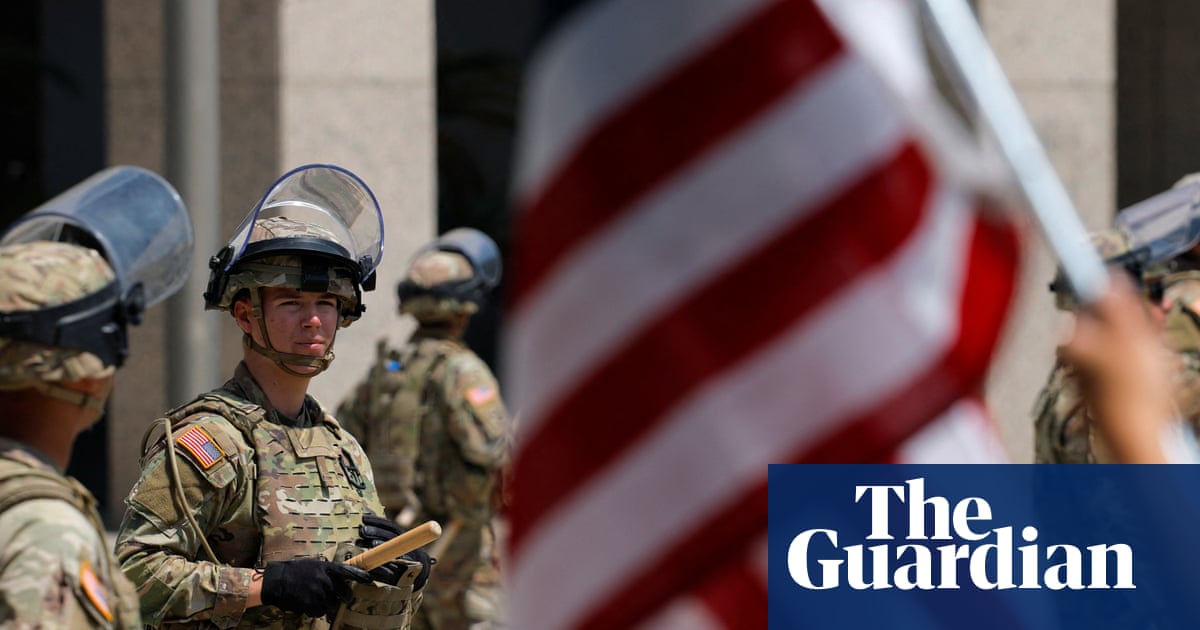Donald Trump’s decision to mobilize the US marines and national guard troops toLos Angelesis expected to cost taxpayers at least $134m and continue for a minimum of 60 days, the US defense secretary, Pete Hegseth, told lawmakers during a House hearing on Tuesday.
A total of 2,700 military personnel – 700 marines and 2,000 national guard troops – were dispatched to the city on Monday, intensifying a federal presence that bothGavin Newsom, the California governor, and Karen Bass, the Los Angeles mayor, have publicly opposed.
“The current cost estimate for the deployment is $134m, which is largely just the cost of travel, housing and food,” said Bryn Woollacott MacDonnell, special assistant to the secretary of defense, during a House subcommittee meeting.
“We stated very publicly that it’s 60 days because we want to ensure that those rioters, looters and thugs on the other side assaulting our police officers know that we’re not going anywhere,” Hegseth added.
During a hearing of the House appropriations subcommittee overseeing the Pentagon that was meant to discuss Trump’s proposed budget, Hegseth defended Trump’s decision to deploy marines and national guard troops, telling lawmakers that the mobilization was necessary to assist with deportations and control rioters he claimed were in the country illegally.
Democrats used the opportunity to press Hegseth, a former Fox News host who was one of the most controversial of Trump’s cabinet nominees, on the legality and cost of mobilizing military forces against civilians who last week beganprotesting arrests of suspected undocumented immigrantsby Immigrations and Custom Enforcement (Ice).
“What’s the justification for using the military for civilian law enforcement purposes in LA, and why are you sending war fighters to cities to interact with civilians?” asked theCaliforniaDemocratic congressman Pete Aguilar.
“Every American citizen deserves to be live in a community that’s safe, and Ice agents need to be able to do their job. They’re being attacked for doing their job, which is deporting illegal criminals,” Hegseth replied.
The Los Angeles police department chief of police, Jim McDonnell, said on Monday that the arrival of military forces complicated efforts to de-escalate tensions on the ground. “The possible arrival of federal military forces in Los Angeles – absent clear coordination – presents a significant logistical and operational challenge for those of us charged with safeguarding this city,” McDonnell said in astatement.
The protests erupted late last week following immigration raids that led to the arrests of more than 40 individuals. Demonstrations intensified over the weekend, with crowds blocking highways and setting fire to vehicles. Police have responded with teargas, rubber bullets and flash-bang grenades.
Trump’s decision to send troops without state consent has resulted in Democrats accusing the administration of federal overreach. California officials havefiled a lawsuitagainst the Trump administration, arguing that the federal mobilization violates state sovereignty.
Trump again defended the mobilization on Tuesday, stating the troops will remain in place “until there’s no danger”. He reiterated his stance that sending troops was necessary to prevent a “horrible situation”.
Trump also told reporters in the Oval Office that he had last spoken to Newsom “a day ago” about the protests in LA, but Newsom denied these claims, saying: “there was no call. Not even a voicemail,” in a social media post.
“Americans should be alarmed that a President deploying Marines onto our streets doesn’t even know who he’s talking to,” Newsomwrote on X.
During Tuesday’s hearing, Aguilar noted that the federal law Trump cited to bypass the governor allows such a decision to be made only in response to “invasion by a foreign nation, rebellion or dangerous rebellion against the authority of the government of the United States or [if] the president is unable … with regular forces to execute the laws of the United States”. He asked: “Which authority is triggered here to justify the use?”
Sign up toThis Week in Trumpland
A deep dive into the policies, controversies and oddities surrounding the Trump administration
after newsletter promotion
“I don’t know. You just read it yourself so people can listen themselves, but it sounds like all three to me,” Hegseth shot back, before alleging that demonstrators engaging in violence were in the country illegally.
“If you’ve got millions of illegals you don’t know where they’re coming from, they’re waving flags from foreign countries and assaulting police officers and law enforcement officers, that’s a problem.”
The Minnesota Democratic congresswoman Betty McCollum asked Hegseth why it was necessary to deploy marines to LA when no such step was taken when Minneapolis experienced days of rioting following George Floyd’s murder in 2020.
The secretary responded by attacking how the state’s governor, Tim Walz, handled the unrest, then said marines were being sent to LA because of comments made by its police chief. “The police chief said she was overwhelmed, so we helped,” Hegseth said.
It was not immediately clear to whom Hegseth was referring.
Democrats have criticized Hegseth repeatedly in recent months, particularly after hefiredair force Gen Charles Q Brown Jr as chair of the joint chiefs of staff, and later after he was revealed as one of the top Trump administration officials whodiscussed plansto bomb Yemen in a leaked group chat containing a reporter.
But many Democrats, as well as all Republicans, avoided those topics in the hearing, instead asking Hegseth for details about his budgetary needs and his views on the military capabilities of foreign rivals such as Russia and China. The secretary is scheduled to be back at the Capitol on Wednesday for a hearing before a Senate appropriations subcommittee.
